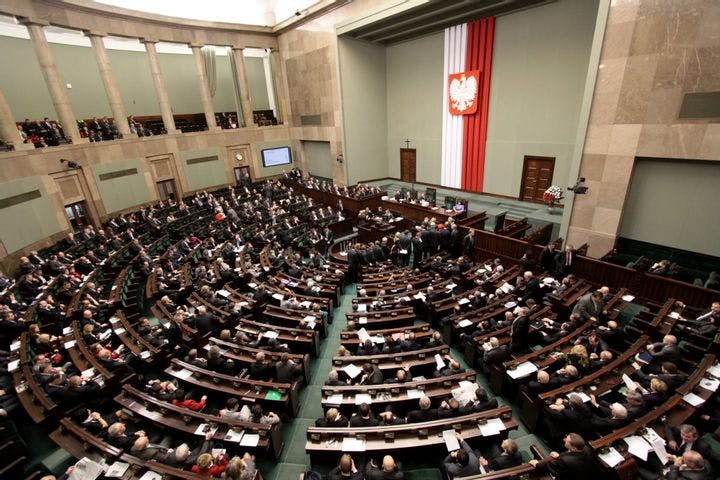Partisan politics dominate Europe. What makes Poland different?
– Shannon Mizzi
Europe has many powerful, and partisan, political parties, but the anti-partisan spirit, so strongly present during the beginnings of local democracy in Poland, has been maintained and institutionalized.
Throughout Europe, the halls of parliaments ring with the voices of organized partisan discord. Britain has its political fights between the Tories, Labour, and the Liberal Democrats. France has its center-left Socialist Party and center-right UMP. Meanwhile in Poland, political parties remain weak, poorly organized, and have yet to weave themselves into the country’s social fabric. The majority of Poles do not identify as members of parties, and the parties themselves are thought to be irrelevant at the local level — just 29.5 percent of the country’s local elected officials are party-affiliated. The European country with the next lowest measurable figure is France, with 60 percent. Why is Poland such an extreme case?
In a recent article in Europe-Asia Studies, Adam Gendzwill and Tomasz Zoltak of the University of Warsaw write that in many formerly communist or Soviet bloc countries, “local politics is closer to the model of political localism, but simultaneously functions with particularly fragile political parties — weakly institutionalized and disliked.” The prevailing attitude in the region is that in a true democracy, parties aren't necessary to take care of local affairs. In fact, it is widely felt that entrenched parties — and the political patronage that comes along with them — only serves to make a municipality less democratic.
Democracy was not established in Poland until 1990. Under communist direction, the central government prevented party competition and, at least nominally, took care of all bureaucratic and infrastructural issues at the local level. After communism fell, power devolved to the local level.
Gendzwill and Zoltak point out that after the 1990 local elections, about three-fourths of the newly elected officials lacked prior experience in governmental structures. “The ideology of local government reform was to a large extent anti-partisan … it referred to the ideas of local activism, volunteerism, and the resources of civil society.” Voters were suspicious of parties, believing they could never truly serve local interests and would instead always be looking out for themselves and the special interest groups that funded them. In response, “local independent politicians managed to organize their own stable networks of supporters and clients and … cultivate an image as actors in a separate sphere of politics, distant from parties and free from their flaws.”
In elections in most industrialized nations, incumbent candidates tend to have a significant advantage over their challengers because they have experience and are usually well-known by the electorate. Poland is no different; in fact, the authors argue, in Poland, municipal-level voting “is frequently understood as a plebiscite or a vote of confidence in the mayor.” Political experience, personal charisma, and the strength of the local network created are generally more significant factors for candidates than party affiliation, or lack thereof. Because this is what is valued by local voters, candidates do not need to rely on a national party structure for resources and support.
Polish political parties that compete at the national level will often try to affect the outcome of local elections by placing chosen candidates in local races as non-partisans, which the authors term “independent camouflage.” In general this strategy has failed; once elected, their candidates are not beholden to that party simply because, if they want to be re-elected, they must respond to local voter demands. The history of and the attitudes of its citizens toward democratization in Poland, then, is still deeply felt and has become entrenched in today’s electoral process. The significant advantage enjoyed by incumbent candidates in Polish municipal elections shows that voting trends apparent in 1990 are still evident today and the “anti-partisan spirit, so strongly present during the beginnings of local democracy in Poland, [has been] maintained and institutionalized.”
Gendzwill and Zoltak observe that a gradual decline of over-arching political parties’ stronghold on voting populations is evident in most 21st century democracies; voters no longer trust parties as much as they once did, and are no longer as active in them as they once were. They remain strong instruments for candidates to use during national elections, but, as voters identify with them less and less, are not as useful at the local level. In Europe, more generally, “calls for a new institutional design which could flexibly mix markets and networks with traditional bureaucracy entailed particular demands that mayors should become neutral leaders responsible for local economic growth.” In this regard, Poland is an extreme case of a more general trend.
If this trend continues — if, for example, more supranational, integrated organizations like the European Union are created and assume greater importance than individual nation-states — parties may eventually become less relevant at the national level as well. What would fill the void?
* * *
The Source: “Why Do Non-partisans Challenge Parties in Local Politics? The (Extreme) Case of Poland” Adam Gendzwill and Tomasz Zoltak, Europe-Asia Studies, 2014.
Photo courtesy of Ministry of Foreign Affairs of the Republic of Poland
